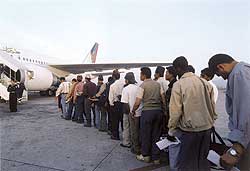 Now times have changed! Not too long ago in Kathmandu, the police used to lathi charge political rallies and leave the aspiring migrant workers queuing up outside recruiting agencies to their own business.
Now times have changed! Not too long ago in Kathmandu, the police used to lathi charge political rallies and leave the aspiring migrant workers queuing up outside recruiting agencies to their own business. Last week, just the opposite took place. According to local newspapers, the police had to 'control' thousands of Nepalis who wanted to be among the 800 selected for a job in small and medium private sector enterprises in South Korea. Lured by visions of a better future, they showed up in droves from all across the country. Meanwhile, a mass meeting on the future of the nation convened by various political parties at Tundikhel's Open Theatre had a thinner attendance and passed rather uneventfully.
The line of South Korean hopefuls snaked all the way from Dasrath Stadium to Maitighar. Those who made it to round two of the selection swelled into the Birendra International Convention Centre in Baneshwor. Very soon the sheer volume of Nepalis seeking foreign employment will not be accommodated in small offices in the alleys of Putali Sadak or Lazimpat.
If nothing else, the events of last week indicates that no matter what occupies our ageing political netas, the dominant thought among young Nepalis has to do with improving their future by getting well-paid jobs in or out of Nepal. Nevermind that the agencies charge up to Rs 100 thousand to place them in a sausage-packing factory on the outskirts of Seoul.
Given that nearly 80 per cent of Nepal's 23 million population is below 40 (with many above the age of 10 either underemployed and unemployed-or what the Central Bureau of Statistics (CBS) cryptically calls "self employed"), the burden of employment-related concerns will only increase in coming years. In the future this will be the single-most dominant agenda in national policy-making and politics.
That is obvious enough. But what remains unclear is the state's role in assisting the private sector in either creating more jobs nationally or finding new labour markets around the world. So far, in either case, the state's record has been meddlesome at best and downright hostile at the other extreme.
Changing the mindset: In Nepal, the state is a mother figure, a caretaker who caters to every whim and fancy, often by diverting funds from one needy area to another less critical sector. Our political parties too like to don the cloak of the people's caretaker, but in a country where more work for themselves than for others (as per the CBS findings), the questions are larger. Do Nepalis really want an all-providing state that comes across as a bumbling elephant? Or do they want security, law and order, basic education, health-care and roads, while allowing competition to let the private sector provide for jobs?
Changing the state's image is important because it has a wider effect on how private sector firms-including those dealing with national and international labour markets-become more nimble in seizing opportunities for our collective prosperity. Once the state sees itself as the facilitator, then it's more likely to understand what it needs to do to make it easier for the private sector to start new enterprises or expand existing ones and hire more people.
Until then, we will continue to have the kind of disjoint we saw last week. Political parties, who are supposed to represent the people, will continue with fewer supporters. And young Nepalis will continue to leave. The political parties must address the needs of the young and the unemployed, and adapt themselves to the changing aspirations of the Nepali people.



